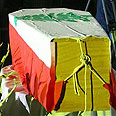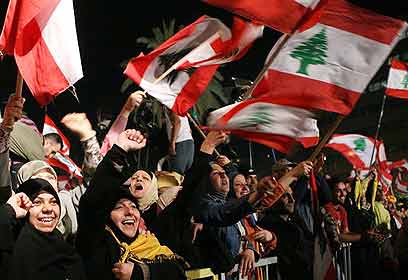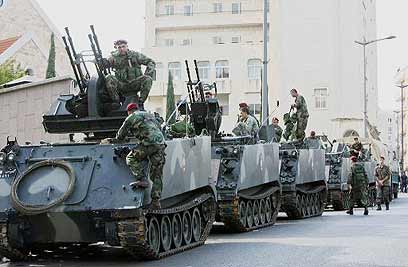
Lebanese army increases forces in tense Beirut
Several thousand soldiers deploy across town Monday, in wake of killing of pro-Syrian demonstrator and fears mass anti-government protests could turn into sectarian violence. Arab League head Moussa warns crisis could worsen
Lebanon's army deployed more soldiers in Beirut on Monday after the killing of a pro-Syrian Shiite Muslim demonstrator raised fears anti-government protests could turn into sectarian violence.
Arab League Secretary-General Amr Moussa warned the crisis could worsen and indicated he had discussed ideas for a solution with Lebanese officials during a 24-hour visit to Beirut.
Security sources said the military increased its forces in Sunni districts that Shiite protesters drive through to get to central Beirut where the Hizbullah-led opposition is holding a sit-in to try to topple the Western-backed government.
These districts saw clashes between residents and protesters on Sunday - from stone-throwing to fights with knives.
In the most serious incident, gunmen fired assault rifles at a group of protesters in a Sunni neighborhood, a stronghold for the anti-Syrian majority coalition, killing one man.
The body of Ahmed Mahmoud was brought to the protest site, where thousands of anti-government demonstrators read Koranic verses over a coffin wrapped in a Lebanese flag.

Protest in Beirut Monday (Photo: AP)
The opposition plans a mass funeral on Tuesday and said the death would not halt its drive to unseat the government.
"Siniora out, we want a free government," the crowd chanted during a night rally at the tent camp, referring to the Western-backed Sunni prime minister, Fouad Siniora.
Blame game between HIzbullah, anti-Syrian camp
Hizbullah accused members of the anti-Syrian camp Sunday night of being the ones who opened fire in Beirut. According to Hizbullah, "Members of the armed militia of the al-Mutaqbal stream (a reference to Saad al-Hariri's faction) opened fire at the young Ahmad Mahmoud who took part in the demonstration in Beirut center, and injured another few people."
The rival camp vilified the opposition. In Hariri's newspaper, al-Mustaqbal, it was claimed that Damascus and Tehran are politically involved to the hilt in an attempt to carryout a Hizbullah coup in Lebanon.
It was also reported that the Lebanese army arrested three Syrian civilians suspected of trying to provoke violent acts. According to the report, the three were handed over to Lebanese intelligence for interrogation.
Another civil war on way
A few thousand soldiers and police were deployed around Beirut on the fourth day of the protests. Troops sat atop armored vehicles at road junctions.
Many politicians and observers have said the crisis could spill over into sectarian strife in a country that has gone through two civil wars in the last 50 years.

Armed reinforcements role into Beirut (Photo: AFP)
Lebanon's most senior Shiite cleric Grand Ayatollah Mohammad Hussein Fadlallah called for unity.
"One of the most dangerous things is the devilish state of sectarian instigation by some political symbols ... which is making the political dispute open to sectarian sensitivities," Fadlallah said on Monday.
The leader of the anti-Syrian majority coalition, Sunni Saad Hariri also urged calm and asked his supporters to ignore what he called provocations.
Germans pressuring Syria
German Foreign Minister Frank-Walter Steinmeier arrived in Damascus and asked President Assad to help preserve stability in Lebanon, calling Syria to avoid any direct or indirect activity that would undermine stability in the country that many fear is on the verge of civil war.
Assad, for his part, said that Syria is "part of the solution," and not the problem, saying that his country does not get involved in anyone else's issues.
Financial crisis feared
Moussa met Lebanese leaders including Hizbullah officials during his brief visit. "The whole Arab arena can't stand by and watch a situation that could develop to the worse," he said.
Asked about his plans to resolve the problems, he said: "It is still at its beginnings, but I see that it is a start that gives some hope."
Pro-Syrian President Emile Lahoud welcomed Moussa's efforts but said the Lebanese should settle the crisis themselves. "We learnt this from experience," his office quoted him as saying.
Thousands of protesters spent a fourth day at the tent city that has sprouted in central Beirut outside the main government complex where Siniora was spending his days and nights.
Many banks and businesses were closed on Monday in the downtown area, Lebanon's banking and commercial center. Business owners in the area have said a lengthy closure could devastate businesses and force employers to cut jobs.
Reuters contributed to this report










